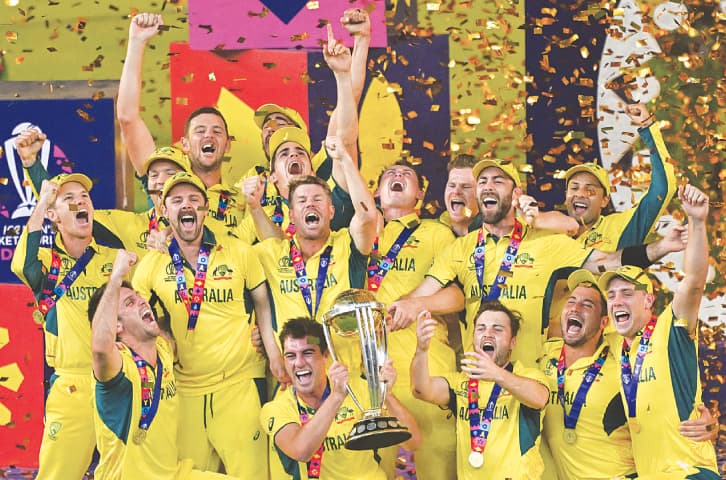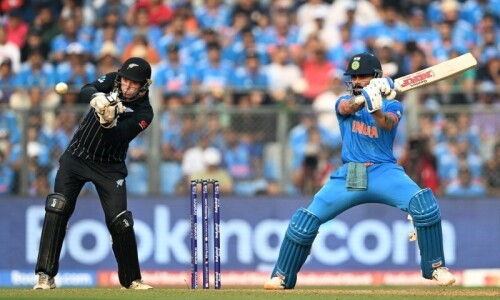
ON Sunday 19th November 2023, on the day of the 13th ODI World Cup Final, the grownups entered the room — or, more precisely, the Narendra Modi Stadium in the Sardar Vallabhbhai Patel Sports Enclave, Ahmedabad, India.
The stadium, ostensibly a monument to cricket, is in fact a monument to one man, the previously named Narendra Modi, who was present. Imagine moving Lord’s, the home of English cricket, to Grantham, the home of Margaret Thatcher, and you get some sense of the historical insult heaped upon Delhi, Kolkata, and Mumbai.
Or, you get some sense of the power of one man. Almost 130,000 Indian fans gathered for the crowning glory of Modi’s rule — a home World Cup win in a sport that is now as Indian as kabaddi.
The almost 130,000 were almost all bedecked in India’s blue cricket jerseys, with the exception of a few yellow Australians, and a number of empty orange seats, presumably belonging to over-optimistic supporters of eliminated teams — though it must be noted, without comment, that Shah Rukh Khan, Bollywood’s finest, was generally ungroomed and wearing white.
The stadium, in fairness, looked resplendent, a sea of blue and green, speckled with yellow and orange, made brilliant by the brilliant stadium lights.
Outside was India — as dusty, polluted, and dull hewn as any country of South Asia. The real India. The India of daily struggles to earn a wage and feed a family. The India of overpopulation and religious intolerance; the India that is still “of South Asia”. The India that Modi doesn’t want to show.
Inside was the India to be showcased, the modern, vibrant, rich, middle class, world-leading India. And, as referenced, the grownups had entered the room. The grownups were the men of Australia, rough hewn brawlers, playing a version of the sport that is hard and sometimes unfair.
They knew where to bowl — short, and at the glamorous Indian batsmen — and they knew how to bat with the necessary grit and brutality. Most of all, they knew how to win, unintimidated by the almost 130,000.
The grownups were also the men of India, in their Kohli beards, their batting swagger, their bowling magnificence, and their sense of destiny before their blue army of almost 130,000.
Virat Kohli stood up as ever, even as his fellows succumbed around him, and then he stood still, in shock and disbelief, when he played on, a half century for a destiny half fulfilled, as if waiting for Loki to turn back time in the Marvel Multiverse, to play the shot again, safely in front of him, safe in his pursuit of his destined century.
These were not the teeny TikTokers of Pakistan, the YouTubers cum cricketers, who started breezily but froze in front of the almost 130,000 when it was their moment in the brilliant lights, whose cricket board showcases the worst of South Asia, whose overburdened captain has resigned, struggling for the final few percentage points to secure his greatness, whose great World Cup winning captain is shamefully a political prisoner, whose cricket is a tamasha.
No, this was a tournament for grownups, for mature, thoroughbred cricketers, for players of Test cricket calibre and T20 bravado, for players of temperament and technique, who know how to play the moment.
And that is why the grownups of Australia, India, New Zealand, and — to some degree — South Africa excelled. Here were players of old school and new school, experts in batting or bowling or both, no bits and pieces artists, no lazy hitters or lollipop bowlers.
The overriding lesson of this World Cup is that 50-overs cricket is best viewed as a shortened Test match, demanding the same disciplines and skills with a dash of urgency and ingenuity.
The finalists might have fielded the same elevens in a Test match. Good players will adapt, whatever the format.

Indeed, many other teams might say the same about their batting, but what set Australia and India apart is the quality of their bowling, varied and Test class. In a format too loaded in favour of batsmen, it was the bowlers who made the difference, carrying their teams to within a match of the title. It helps too if those bowlers can bat, and it was here that India came up short setting a target.
More broadly, 50-overs cricket showed that it isn’t a format that needs tinkering with, except to rebalance the equation between bat and ball. One step would be to end the nonsense of umpire’s call, one of the last remnants of error, bias, and controversy in cricket.
Rely on ball tracking, and if the ball is hitting the stumps give it out. Umpire’s call might have cost Pakistan a semi-final place, it might have cost India the final when Jasprit Bumrah struck Manus Labuschagne’s pads in a pivotal comeback over.
The teams with solid cricket structures, with boards who had planned for the long term, with organisational order — other than England’s end of an era squad — were the ones that prospered, and they are the ones that keep prospering. There is a lesson for the rest in those simple truths.
This was also a tournament without minnows. Afghanistan tussled with the best. We expected more of Bangladesh, such is their progress. Sri Lanka were well below par but still came with the pedigree of one-time champions.
Even the Netherlands fought. It meant that West Indies were missed, albeit not as much as was expected. The global game, and the 50-over format, has emerged stronger.
When India won its first World Cup in 1983, the celebrated moment was Kapil Dev’s running over-the-shoulder catch off Viv Richards in the final. Rohit Sharma is an astounding player, but he is no Viv Richards, however, Travis Head’s catch to dismiss Rohit when India were flying carried echoes of Kapil’s — a momentum shift that developed an unstoppable aura.
Head followed with a match-winning century, when Australia were tottering, when the pressure of the almost 130,000 was sucking the oxygen from the air around Australia’s response, when Kohli’s half century and India’s magnificent bowlers seemed enough to deliver what destiny promised.
Labuschagne, for his part, played a beautiful Test innings. Above all, Travis reminded us, if anybody needed reminding, that cricket at the highest level, of whatever format, is won in the head.
Australia reprised, as Steve Waugh’s team did in 1999 and Imran’s team in 1992, that it is the team that has the will and the skill to peak at the right moment that takes the crown. India were the best team over the course of their own tournament, no doubt.
You can own a sport, dominate it, intertwine a national obsession with a national identity, believe in your destiny to triumph, believe in the spiritual powers of the almost 130,000, but you can’t legislate for eleven grownups entering a room and spoiling your party.
Published in Dawn, November 20th, 2023














































Dear visitor, the comments section is undergoing an overhaul and will return soon.